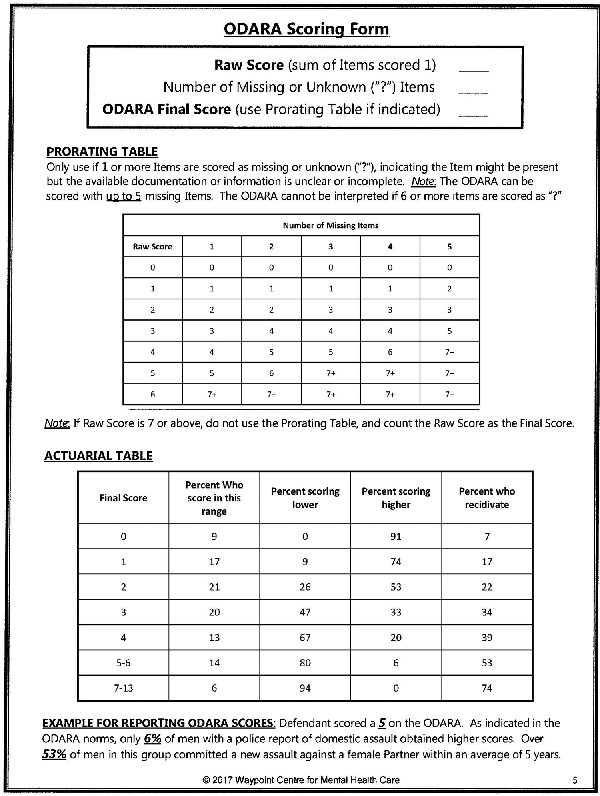THE GENERAL ASSEMBLY
THE GENERAL ASSEMBLY
COMMISSION ON SENTENCING
Proposed Model Pretrial Risk Assessment Tool
[50 Pa.B. 294]
[Saturday, January 18, 2020]The Pennsylvania Commission on Sentencing hereby publishes for public comment a proposed model pretrial risk assessment tool. The proposed model pretrial risk assessment tool, Ontario Domestic Assault Risk Assessment, is set forth in Annex A.
Act 14 of 2018, effective April 16, 2018, amended 18 Pa.C.S.A. § 2711 (relating to probable cause arrests in domestic violence cases) to provide the following:
(c.1) Pretrial risk assessment tool.—The president judge of a court of common pleas may adopt a pretrial risk assessment tool for use by the court of common pleas or by the Philadelphia Municipal Court, the Pittsburgh Magistrates Court or magisterial district judges when acting as the issuing authority in cases under this section. The issuing authority may use the pretrial risk assessment tool to aid in determining whether the defendant poses a threat of danger to the victim. However, the pretrial risk assessment tool may not be the only means of determining whether to admit the defendant to bail. Nothing in this subsection shall be construed to conflict with the issuing authority's ability to determine whether to admit the defendant to bail under the Pennsylvania Rules of Criminal Procedure.
(c.2) Pennsylvania Commission on Sentencing.—The following shall apply to the Pennsylvania Commission on Sentencing:
• The Commission shall develop a model pretrial risk assessment tool which may be used by the issuing authority in cases under this section, as set forth in subsection (c.1).
• Subject to any inconsistent rule of court, in order to ensure that the model pretrial risk assessment tool or other pretrial risk assessment adopted under this section is effective, accurate and free from racial or economic bias, prior to the adoption of the tool the commission shall publish a report on validation using information from cases from the judicial district where the tool is to be utilized. The report shall be updated every two years.
On December 12, 2019, the Commission approved the Ontario Domestic Assault Risk Assessment (ODARA) as a proposed model pretrial risk assessment tool. The Commission is seeking public comment on the proposed model pretrial risk assessment tool as set forth in Annex A.
In accordance with 42 Pa.C.S.A. § 2155, prior to adoption the Commission shall publish in the Pennsylvania Bulletin all proposed risk assessment instruments and hold public hearings not earlier than 30 days and not later than 60 days thereafter to afford an opportunity for the following persons and organizations to testify:
(i) Pennsylvania District Attorneys Association
(ii) Chiefs of Police Associations
(iii) Fraternal Order of Police
(iv) Public Defenders Organization
(v) Law School faculty members
(vi) State Board of Probation and Parole
(vii) Department of Corrections
(viii) Pennsylvania Bar Association
(ix) Pennsylvania Wardens Association
(x) Pennsylvania Association on Probation, Parole and Corrections
(xi) Pennsylvania Conference of State Trial Judges
(xii) Any other interested person or organization
The Commission will hold three public hearings to receive comments on the proposed model pretrial risk assessment tool:
Hearing I. Date: Tuesday, February 18, 2020 Time: 1:30 p.m. Location: Allegheny County Courthouse, Courtroom 327
436 Grant Street, Pittsburgh, PA
Hearing II. Date: Wednesday, February 19, 2020 Time: 1:30 p.m. Location: Juanita Kidd Stout Center for Criminal Justice, Courtroom 304
1301 Filbert Street, Philadelphia, PA
Hearing III. Date: Wednesday, March 4, 2020 Time: 2:00 p.m. Location: Pennsylvania Judicial Center
601 Commonwealth Avenue, Harrisburg, PAPersons or organizations wishing to testify should contact the Commission at least five business days prior to the hearing to register and to provide an electronic copy of any testimony. Written comments from persons or organizations not wishing to testify should be received by the Commission at least five business days before the last-scheduled public hearing. Commission staff will copy and distribute any submitted documents to Commission Members. Please contact Cathy Dittman (814.863.5729 or CWD@PSU.EDU) to register to testify and/or to submit testimony or written comments.
Any other individuals wishing to testify who have not registered five days in advance are asked to provide 30 copies of any testimony at the time of the public hearing.
The Commission will evaluate the proposal after consideration of the testimony and written comments received. The next quarterly meeting of the Commission will be held on Thursday, March 5, 2020, in Room 60 East Wing of the Pennsylvania State Capitol, 500 Commonwealth Avenue, Harrisburg, PA.
REPRESENTATIVE TODD STEPHENS,
Chair
Commentary on Annex A This Commentary provides an overview of Commission's activities and the rationale for approving for public hearings the Ontario Domestic Assault Risk Assessment (ODARA) as the proposed model pretrial risk assessment tool. The Ontario Domestic Assault Risk Assessment (ODARA) is set forth in Annex A.
Annex A is a reproduction of the ODARA scoring form utilized in New Jersey (https://www.nj.gov/lps/dcj/agguide/directives/ODARA-Scoring-Form.pdf) based upon the ODARA manual found in Hilton, N.Z., Harris, G.T., & Rice, M.E. (2010). Risk assessment for domestically violent men: Tools for criminal justice, offender intervention, and victim services. Washington, DC: American Psychological Association.
Act 14 of 2018, signed April 16, 2018, provides the president judge of a court of common pleas the option of adopting a pretrial risk assessment tool for use by: ''the court of common pleas, Philadelphia Municipal Court, the Pittsburgh Magistrates Court, or magisterial district judges when acting as the issuing authority'' pursuant to 18 Pa.C.S.A. § 2711 (relating to probable cause arrests in domestic violence cases). A pretrial risk assessment tool may be used by the issuing authority as an ''aid in determining whether the defendant poses a threat of danger to the victim.''
Act 14 requires the Pennsylvania Commission on Sentencing to ''develop a model pretrial risk assessment tool which may be used by the issuing authority. . .'' The Commission is also required to ''publish a report of validation using the information from cases from the judicial district where the tool is to be utilized.''
In order to meet this mandate, Commission investigated current procedures related to the following: the pretrial process; the information that is considered and available to judicial officers at the preliminary arraignment and the preliminary hearing; existing pretrial and pretrial domestic violence risk assessment tools utilized in the Commonwealth; research and best practices on domestic violence pretrial decision-making; and domestic violence risk assessment tools used in jurisdictions outside Pennsylvania. The steps undertaken by the Commission through engagement with key criminal justice stakeholders are outlined below:
• Site visits—Commission staff met with county practitioners to discuss pretrial practices, DV-specific pretrial practices, the information collected and available to the MDJ at preliminary arraignment, and the availability of pretrial services and programs. Participants in the meetings included Common Pleas and Magisterial District Court judges, district attorneys, public defenders, victim advocates, and staff from pretrial services agencies, probation departments, women shelters and health centers, and child advocacy centers. Meetings were held in the following counties: Allegheny, Cambria, Centre, Chester, Dauphin, Montgomery and Philadelphia counties.
• Meetings with Domestic Violence Experts—Commission staff discussed extant research, best practices, and issues associated with the creation and validation of existing pretrial and domestic violence pretrial risk assessment tools with subject-matter experts from the Pennsylvania Coalition Against Domestic Violence (PCADV), the National Center for State Courts, and with Professors Richard Berk and Susan Sorenson at the University of Pennsylvania.
• Meeting with Pretrial Services Experts—Commission staff also met with a representative of the Pennsylvania Pretrial Services Association and with Matt Alsdorf, President and Founder of Pretrial Advisory and former Vice President for Criminal Justice with the Laura and John Arnold Foundation (LJAF).
• Roundtable Discussion—The Commission hosted a roundtable discussion during its September 5-6, 2018 quarterly meeting with local practitioners and state experts to discuss the role of law enforcement, victim and defendant information, availability of data, procedures for criminal and civil actions, pretrial decisions and services, existing limitations, and how best to utilize the authority under Act 14 to improve decision-making and outcomes.
• Survey of President Judges—An online survey about pretrial practices was sent to President Judges in Pennsylvania. Information was received from 40 counties. The survey revealed that very few jurisdictions make use of a risk assessment tool to inform the bail decision and that no counties currently utilize a pretrial domestic violence risk assessment tool. However, over 32 of the 40 responding counties indicated that they would be interested in adopting a pretrial risk assessment for DV as an aid in determining whether the defendant poses a future threat of danger.
• Review of existing risk assessment tools—Commission staff conducted a thorough review of domestic violence risk assessment tools currently in use. Tools reviewed included: the Danger Assessment (DA), Spousal Assault Risk Assessment Instrument, Domestic Violence Screening Instrument (DVSI), Ontario Domestic Assault Risk Assessment, and Lethality Assessment Program (LAP).
To evaluate each tool, staff considered the intended purpose of the tool (e.g., predict risk of future assault against intimate partners), where the tool was designed/developed, which jurisdictions currently make use of the tool, whether the tool has been validated, how the tool is administered (e.g., by police at the crime scene), whether the person administering the tool needs professional qualifications (e.g., psychologist or trained clinician), and the predictive validity of the tool. This review process allowed staff to assess the relevance and appropriateness of each of the tools and examine whether an existing tool would fit the Commission's mandate.
For example, as of 2017 the LAP was utilized in 43 counties and by over 250 police departments (PCADV). However, despite the high frequency of usage, the LAP is not a good candidate as a model tool since it was not designed to inform the pretrial bail decision for DV cases; instead, it was designed to connect victims to information and services. Similarly, the Danger Assessment was ruled out because the tool was designed to predict a different outcome (intimate partner homicide). It was also determined that SARA is not a practical alternative because the instrument relies on structured clinical assessment by trained psychologists or clinicians. Finally, the DVSI was eliminated from consideration because the tool performed significantly lower on measures of predictive validity than any of the existing tools. ODARA is the domestic violence pretrial tool that best fits the mandate.
• Stakeholder Summit at Duquesne University School of Law—The Commission hosted a one-day summit with subject matter experts and practitioners from Allegheny County to discuss the feasibility of adopting and implementing ODARA. Allegheny County attendees included representatives from Pretrial Services, Probation (including adult and juvenile, and domestic violence unit), District Attorney's Office, Public Defender's Office, and County Court Administration. Additionally, representatives from the Pennsylvania Office of the Victim Advocate and law professors from Duquesne Law School were present. Speakers at the summit included the lead author of ODARA and practitioners from three jurisdictions that are currently using ODARA to inform pretrial decisions for DV cases (Denver, CO; Travis County, TX; Maine).
• Presentation on ODARA Validation—Dr. Jill Messing (Associate Professor in the School of Social Work at Arizona State University) provided a presentation to the Commission during the December 2019 quarterly meeting on issues related to the development and validation of domestic violence risk assessment tools and findings from her research on domestic violence risk assessments (including ODARA).
After a thorough review of research on domestic violence pretrial risk assessment and numerous discussions with experts and key criminal justice stakeholders, Commission staff recommended to the Commission that ODARA serve as the model pretrial risk assessment tool. The Commission voted during its December 11-12, 2019 quarterly meeting to approve this recommendation and to schedule public hearings.
ODARA is an empirically developed and validated actuarial risk assessment tool developed and validated in Ontario, Canada to assess the future likelihood of violence against an intimate partner. The tool includes 13 questions that were found to be the most highly predictive of future violence. Nine of the items are typically collected from victims by law enforcement and the other four are derived from criminal history records. ODARA is currently used to inform the pretrial decision process by assessing the risk of future intimate partner violence in Denver County and City (CO), Travis County (TX), Maine, and New Jersey. The tool is free of charge to use and the designers of the tool provide access to free online training.
All domestic violence risk assessment tools (including ODARA) examined by the Commission have been designed to predict the risk of future violence on intimate partners. However, the current language in the statute defines domestic violence cases as violations of sections 2504 (relating to involuntary manslaughter), 2701 (relating to simple assault), 2702(a)(3), (4), (5) (relating to aggravated assault), 2705 (relating to recklessly endangering another person), 2706 (relating to terroristic threats), 2709.1 (relating to stalking), or 2718 (relating to strangulation) against a family or household member.
Family or household members are defined as ''spouses or persons who have been spouses, persons living as spouses or who lived as spouses, parents and children, other persons related by consanguinity or affinity, current or former sexual or intimate partners or persons who share biological parenthood'' (23 Pa.C.S.A. § 6102). The definition of intimate partner is generally limited to ''a spouse or person who has been a spouse, a person living as a spouse, or current or former sexual partner.''
Annex A
Pennsylvania Commission on Sentencing
Proposed Model Pretrial Risk Assessment Tool

Annex A is a reproduction of the ODARA scoring form utilized in New Jersey (https://www.nj.gov/lps/dcj/agguide/directives/ODARA-Scoring-Form.pdf) based upon the ODARA manual found in Hilton, N.Z., Harris, G.T., & Rice, M.E. (2010). Risk assessment for domestically violent men: Tools for criminal justice, offender intervention, and victim services. Washington, DC: American Psychological Association.

Annex A is a reproduction of the ODARA scoring form utilized in New Jersey (https://www.nj.gov/lps/dcj/agguide/directives/ODARA-Scoring-Form.pdf) based upon the ODARA manual found in Hilton, N.Z., Harris, G.T., & Rice, M.E. (2010). Risk assessment for domestically violent men: Tools for criminal justice, offender intervention, and victim services. Washington, DC: American Psychological Association.

Annex A is a reproduction of the ODARA scoring form utilized in New Jersey (https://www.nj.gov/lps/dcj/agguide/directives/ODARA-Scoring-Form.pdf) based upon the ODARA manual found in Hilton, N.Z., Harris, G.T., & Rice, M.E. (2010). Risk assessment for domestically violent men: Tools for criminal justice, offender intervention, and victim services. Washington, DC: American Psychological Association.

Annex A is a reproduction of the ODARA scoring form utilized in New Jersey (https://www.nj.gov/lps/dcj/agguide/directives/ODARA-Scoring-Form.pdf) based upon the ODARA manual found in Hilton, N.Z., Harris, G.T., & Rice, M.E. (2010). Risk assessment for domestically violent men: Tools for criminal justice, offender intervention, and victim services. Washington, DC: American Psychological Association.

Annex A is a reproduction of the ODARA scoring form utilized in New Jersey (https://www.nj.gov/lps/dcj/agguide/directives/ODARA-Scoring-Form.pdf) based upon the ODARA manual found in Hilton, N.Z., Harris, G.T., & Rice, M.E. (2010). Risk assessment for domestically violent men: Tools for criminal justice, offender intervention, and victim services. Washington, DC: American Psychological Association.
[Pa.B. Doc. No. 20-60. Filed for public inspection January 17, 2020, 9:00 a.m.]
No part of the information on this site may be reproduced for profit or sold for profit.This material has been drawn directly from the official Pennsylvania Bulletin full text database. Due to the limitations of HTML or differences in display capabilities of different browsers, this version may differ slightly from the official printed version.